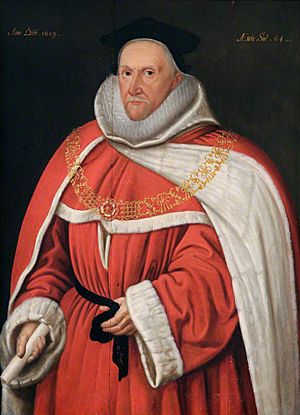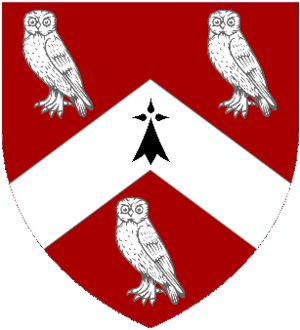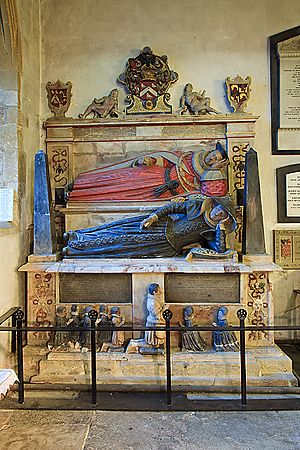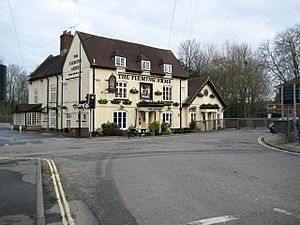Thomas Fleming (judge) facts for kids
Quick facts for kids
Sir Thomas Fleming
|
|
|---|---|

Portrait by Marcus Gheeraerts the Younger
|
|
| Lord Chief Justice of the King's Bench | |
| In office 1607–1613 |
|
| Monarch | James I |
| Preceded by | Sir John Popham |
| Succeeded by | Sir Edward Coke |
| Personal details | |
| Born | April 1544 Newport, Isle of Wight |
| Died | 7 August 1613 Stoneham Park, Hampshire |
| Resting place | St Nicolas' Church, North Stoneham |
| Nationality | British |
| Spouse | Mary James |
| Children | 7 sons, 7 daughters |
| Parents | John Fleming, Dorothy Harris |
| Education | Godshill School and Lincoln's Inn |
| Known for | Judge, Lord Chief Justice of England and Wales, Chief Baron of the Exchequer |
Sir Thomas Fleming (April 1544 – 7 August 1613) was an important English judge and politician. He served in the House of Commons, which is like today's Parliament, at different times between 1581 and 1611.
He was a judge during the famous trial of Guy Fawkes, who was involved in the Gunpowder Plot. Sir Thomas Fleming held several very important jobs in the legal system. These included Lord Chief Justice, Lord Chief Baron of the Exchequer, and Solicitor General for England and Wales.
Contents
Early Life and Education
Thomas Fleming was born in April 1544. His father, John Fleming, was a merchant from Newport on the Isle of Wight. His mother was Dorothy Harris. The Fleming family had lived on the Isle of Wight for a long time.
Thomas went to school in Godshill. He later studied law at Lincoln's Inn, which is a famous place for training lawyers in London. He became a lawyer in 1574.
Sir Thomas Fleming's Career
Thomas Fleming became a Member of Parliament (MP) for Winchester in 1584. He was chosen again in 1593. He quickly moved up in the legal world. In 1594, he became a serjeant-at-law, which was a high rank for a lawyer. Soon after, he became the Recorder of London, a chief legal officer for the city.
Becoming Solicitor General
In 1595, Elizabeth I, the Queen, personally chose Thomas Fleming to be the Solicitor General. This job is a senior legal advisor to the government. She chose him over another famous lawyer, Francis Bacon. This showed everyone that the Queen had the final say in who got important jobs.
Other lawyers, especially Sir Edward Coke, praised Fleming. They said he had "great judgments, integrity and discretion," meaning he was wise, honest, and careful.
In 1597, Fleming became an MP for Hampshire. He bought a large estate called North Stoneham in 1599. In 1601, he was elected MP for Southampton. However, his first speech in the House of Commons was not successful. He got nervous and stopped speaking. After that, he never gave another speech in Parliament.
When James I became King in 1603, Fleming was again made Solicitor General. He was also knighted, which means he was given the title "Sir." He was re-elected as MP for Southampton in 1604.
As Lord Chief Baron
In 1604, Sir Thomas Fleming was promoted to Lord Chief Baron of the Exchequer. This was another very important judge position. In this role, he was one of the judges who tried Guy Fawkes after the Gunpowder Plot.
Another important case he handled was called Bates's Case in 1606. This case was about whether the King could charge taxes without Parliament's approval. A merchant named John Bates refused to pay a tax on currants. Fleming ruled that the King had the power to set taxes as he saw fit. This decision was very controversial and caused problems between the King and Parliament later on.
Becoming Lord Chief Justice
In 1607, Sir Thomas Fleming became the Lord Chief Justice of England. This was the highest judicial position in England.
The next year, he helped Newport get a special document from the King. This document allowed the town to elect a Mayor instead of having an appointed official. He also helped set up a free grammar school in Newport.
In 1608, Fleming was one of the judges in a case about people born in Scotland after James I became King. He agreed with most judges that these people should have the same rights as those born in England.
On August 7, 1613, Oxford University gave him an honorary Master of Arts degree. This was the same day he died.
Death and Burial
Sir Thomas Fleming died suddenly on August 7, 1613, at Stoneham Park in Hampshire. He had been celebrating with his servants and farm workers the day before. He went to bed feeling well but became ill during the night and passed away before morning.
He was buried in St. Nicolas' Church, North Stoneham. A grand monument marks his grave, showing statues of him in his judge's robes and his wife.
Family Life
Sir Thomas Fleming married his cousin, Mary James, on February 13, 1570. Mary's father, Dr. Mark James, was a personal doctor to Queen Elizabeth I. They were married in Newport.
They had fifteen children together. Six sons and two daughters were still alive when Sir Thomas Fleming died. His sons Thomas and Philip both became Members of Parliament. Another son, Francis, worked for Oliver Cromwell.
The Fleming family owned the Stoneham Park estate until at least 1908. The Fleming Arms public house (a type of pub) and Fleming Road in Swaythling are named after the family. There is also another pub called the Fleming Arms in Binstead, Isle of Wight.
Arms
 |
|
 | Sharif Bey |
 | Hale Woodruff |
 | Richmond Barthé |
 | Purvis Young |



